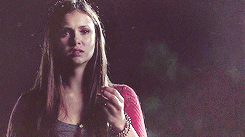everything that used to matter doesn't anymore.

(The macro has nothing to do with the post.)
So, rather than do an actual episode review for TVD 4.06, upupa_epops asked me to write some meta on some topic or other. I thought I would consider a parallel that caught my eye because - when in doubt, do parallels.


1.20 / 4.06
tw: suicidal ideation, self-harm
(... I'd put a gif of the scene from 1.20 here too but that would require looking for one in Stefan/Stelena blogs so)
I'm surprised that nobody's talking about this one because it struck me from first viewing. In both scenarios, Stefan and Elena each dispose of their rings and go to the place where they believe they were supposed to die "the first time" in order to commit suicide. I know this show is obsessed with hammering home how alike Elena and Damon are -- and that's true, too -- but it's obvious that Stefan and Elena's characters also mirror one another in various ~ways, chief of these being their gargantuan guilt complexes and yearning to be "good".
When Elena "saves" Stefan in 1.20, she appeals to that desire to achieve goodness -- "you made a choice to be good", "you can put on this ring and keep fighting", etc., i.e. to ultimately reject the "other" Stefan who deserves to die because of his harmful actions. This is essentially a life-affirming scene, but in hindsight I can't not notice how much Elena's argument in favour of life is informed by her own trauma, by her personal belief that life is something you have to "deserve", to keep "fighting" for. Her pep talk to Stefan is deeply moral in nature, centred around the idea of redemption -- "there will be no next time".
When the whole bridge sequence in 4.06 started I thought we'd get something similar to 1.20 except with Damon and Elena, i.e. Elena wanting to commit suicide and Damon talking her out of it. Not so.
And, actually -- good. Because as affecting as that 1.20 Elena/Stefan scene is it also subtly engenders a deep codependency that sets the stage for just about all the unhealthiness in their relationship later on. In S1 Elena takes it upon herself to "save" Stefan, not physically but "morally", emotionally, spiritually, &c. &c. and later on in S3 she'll try exactly the same thing on a much larger scale, to her own detriment ("there will be no next time", she said -- but there was). Since she initially succeeds in convincing Stefan to keep fighting, what eventually happens is that she becomes his primary reason for doing so in his darkest periods ("you are the one thing that has kept me from giving up", etc.). He owes her. And she owes him.
What's interesting in contrast about this 4.06 bridge sequence is that there is no moment of "revelation". Elena does not come to a heartwarming conclusion about the significance and meaning of life, nor does Damon give it to her. He doesn't "banish" her demons for her. In fact, his actions on that bridge are nothing but practical: he saves Elena's physical life, saves her from an external physical threat (= the sun). But that doesn't actually amount to "fixing" her, or saving her "from herself", no matter what starry-eyed shippers are saying. The hallucinations canonically fade because Jeremy & co. manage to break the curse on the other side of town. All Damon does is wait with Elena until the fog lifts, and remove her from harm's way.
Yet, this is so significant precisely because it's mundane. When someone is mentally unwell, you don't "save them from themselves". You don't. It can't be done. All you can do is be there for them, and respond to their cry for help. This is why the bridge sequence in 4.06 is so satisfying for me personally -- because it doesn't offer up any idealistic messages about beating mental illness.
On a related note, I think another distinction between the two sequences is that in 4.06 there isn't any "romantic reward". After Stefan finally comes around in 1.20 and decides to keep fighting, the scene concludes with him and Elena kissing and embracing and the camera pans out to frame the two of them together in the half-light. [Note: Let me be clear that I don't think that scene is about The Power of Love. Elena manages to get through to Stefan by using her powers of rationality, by appealing to his moral principles, not by arguing "because you love me" (that happens later). But the framing of the scene itself is necessarily romantic -- Elena metaphorically pulls Stefan back from the edge and then they reunite as lovers, music swells, etc. Needless to say, this whole romantic fantasy is deconstructed later on in the series, but in that specific scene it's played wholly straight.] 1.20 ends with Stefan and Elena together again and back in romantic bliss. In STARK contrast, Elena's own suicidal meltdown-and-recovery in 4.06 ends with their breaking up. Bam.
You could argue that the above means that Elena might be trying to replace one saviour (Stefan) with another (Damon), one salvation-via-love narrative with another. But I think if that was the story the show was telling, then this episode would have ended with a romantic union between Elena and Damon in place of or after that Elena/Stefan break-up scene. Positioning is everything. (Don't mistake me, I think Elena obviously is inclined to build romantic fantasies about men who save her, and that's apparent with her googling eyeballs in that last Elena/Damon scene. Still, somehow I doubt Damon's going to play along with that script.)
In conclusion: ... I don't actually know what the conclusion is. Elena and Damon have a different and possibly healthier codependence than Elena and Stefan, lol? I guess we'll see better in later episodes, but at this point I want to say that Elena's S1-3 arc of linking "life" with "goodness" is truly done, officially so with this episode. When Elena implicitly asks Damon to save her -- moments after the curse is lifted -- it's not because she's decided the goal of redemption is one she needs to keep pursuing. There's no revelation of that kind because it no longer matters; it is irrelevant to who she is now. Rather, when Elena asks for help she does so for no other reason than she does not want to die. And after starting the season being "ready" to do so, believing she should have done -- that's huge.